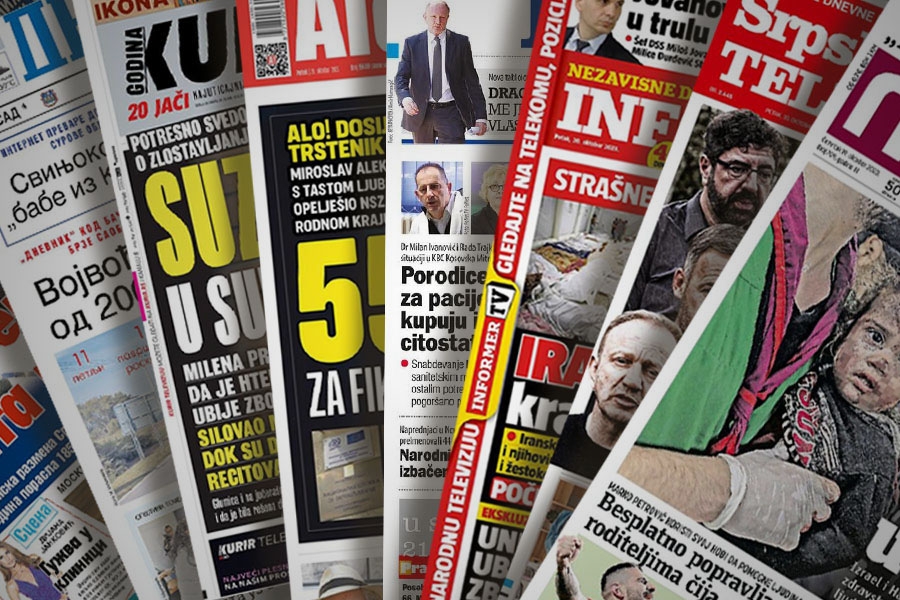Unfair redistribution of state money for advertising will be another consequence of the new public information and media law if the act accepted by the Government of Serbia last week is adopted in parliament. Namely, the Draft Law on Public Information and Media allows Telekom to be the founder or owner of media in Serbia, which will formally return the state to media ownership and allow Telekom to become a dominant player in the media market. Telekom is one of the most influential and largest advertisers with a huge budget, which will be directed towards its own or affiliated media. At the same time, those who are inappropriate, i.e., critically oriented towards the authorities, will be left without income, which is a path to abolishing an already fragile media pluralism. Thus, due to the lack of regulation on the distribution of state money for advertising, many media will be in danger of being forced to "sell out" or close their doors after a certain period.

Unfair redistribution of state money for advertising will be another consequence of the new public information and media law if the act accepted by the Government of Serbia last week is adopted in parliament. Namely, the Draft Law on Public Information and Media allows Telekom to be the founder or owner of media in Serbia, which will formally return the state to media ownership and allow Telekom to become a dominant player in the media market. Telekom is one of the most influential and largest advertisers with a huge budget, which will be directed towards its own or affiliated media. At the same time, those who are inappropriate, i.e., critically oriented towards the authorities, will be left without income, which is a path to abolishing an already fragile media pluralism. Thus, due to the lack of regulation on the distribution of state money for advertising, many media will be in danger of being forced to "sell out" or close their doors after a certain period.

The proposed media laws, which have caused heated public debates, do not address state advertising in the media, one of the key elements for establishing a fair and transparent media market and one of the prerequisites for media sustainability.
This area of redistributing state money to the media has, until now, been in a "gray zone" due to a lack of clear criteria for distribution, which is why most advertisements and state funds have flowed to suitable media.
The state has not conducted a comprehensive analysis of the relevant media market, which should include the advertising market, to get a clear picture of the problems and disturbances.
State advertising, or advertising by public authorities and companies that are partly or wholly state-owned, can significantly disrupt the media market, as certain media companies are significantly favored.
Furthermore, through direct or indirect advertising, the state and state-owned companies strongly influence the media, which, due to profits from ads, which are often their only way to survive, become more favorable and prone to self-censorship or lose ads.
Therefore, the issue of state advertising in Serbia is not regulated in such a way as to create equal market conditions for all media, even though the authorities say that the laws concerning the media need to be harmonized with European standards.
However, in Europe, it is different.
Last year, the European Commission adopted the European Media Freedom Act, which aims to protect media pluralism and independence and deals explicitly with the distribution of state advertising.
The Act provides measures to protect against political interference in editorial decisions, focusing on the independence and stable financing of public media, on the transparency of media ownership, which implies the exclusion of the state from ownership, and on fair distribution of state advertising.

Foto: Printscreen: Yourtube
The law establishes new requirements for allocating state advertising to the media to ensure it is non-discriminatory and transparent.
It is also envisaged to improve the transparency and objectivity of the audience measurement system, which affects advertising revenue in the media, especially on the Internet.
For example, in Croatia, money from state advertising is distributed according to ratings.
In Serbia, this area remains a gray zone.
In June, media associations announced that the Ministry of Internal and Foreign Trade had established a working group for amendments to the Advertising Law but had not even informed the Ministry of Information and Telecommunications, responsible for implementing the Media Strategy.
The Media Strategy pays great attention to state advertising.
The strategy states that the regulation should be amended to create equal market conditions for all media and a regulatory framework for advertising by public authorities and companies in which the state is the majority owner or predominantly funds them.
In other words, the redistribution of state money should follow specific criteria.
In our case, however, we will find ourselves in a situation where Telekom, a capital company engaged in electronic communications, can establish companies that own media.
Money will undoubtedly and by law flow to these media.
At the same time, how other state bodies will allocate their money for ads remains undefined.
The owner and editor of the weekly newspaper "Nedeljnik," Veljko Lali?, told Demostat that freedom of the media and civil societies emerged in the nineteenth century with the free flow of advertisements.
“If a law like the one adopted in Europe were to be adopted, we would soon have an orderly media scene because party newspapers have never succeeded anywhere,” he stated.
He says that share is one way the distribution could be determined.
He explains that, according to IPSOS data, RTS has a 24 percent market share, while "Nedeljnik," which is 15 times smaller than RTS, has 1.6 percent. On the other hand, Euronews Serbia, which is 16 times larger than "Nedeljnik," has 0.1 percent.
“RTS has a budget of 120 million from citizens money and still takes advertisements. They have 150 times more funds than "Nedeljnik" and are 15 times larger, while Euronews has 20 times more funds than "Nedeljnik," but is 16 times smaller in market share,” he stated.
“If we had a law like the European one, every media outlet would rightfully be able to ask on what basis certain media receive their share of the large pie called state money for advertising.”
On October 20, the Government of Serbia adopted drafts of media laws, and the Draft Law on Public Information and Media and the Draft Law on Electronic Media were sent to the Serbian Parliament, which will, after discussions on the laws in principle, as well as amendments, express its opinion on these acts.
In all societies there are issues that are rather being skipped. Certain...
The neoliberal path, started in 2001, has led to especially bad results in Serbi...
For centuries, the region was subsumed within the Ottoman and Hungarian Empires,...
"Serbia has returned to the systemic and anti-systemic position of the political...
In reality, Serbia is closer than ever to NATO. In the course of the last five y...